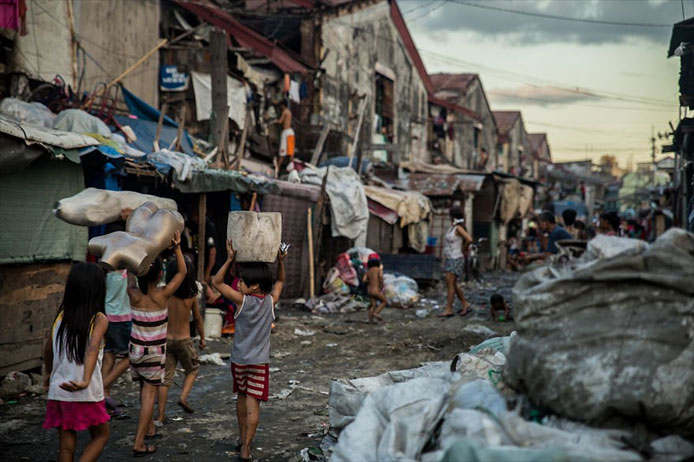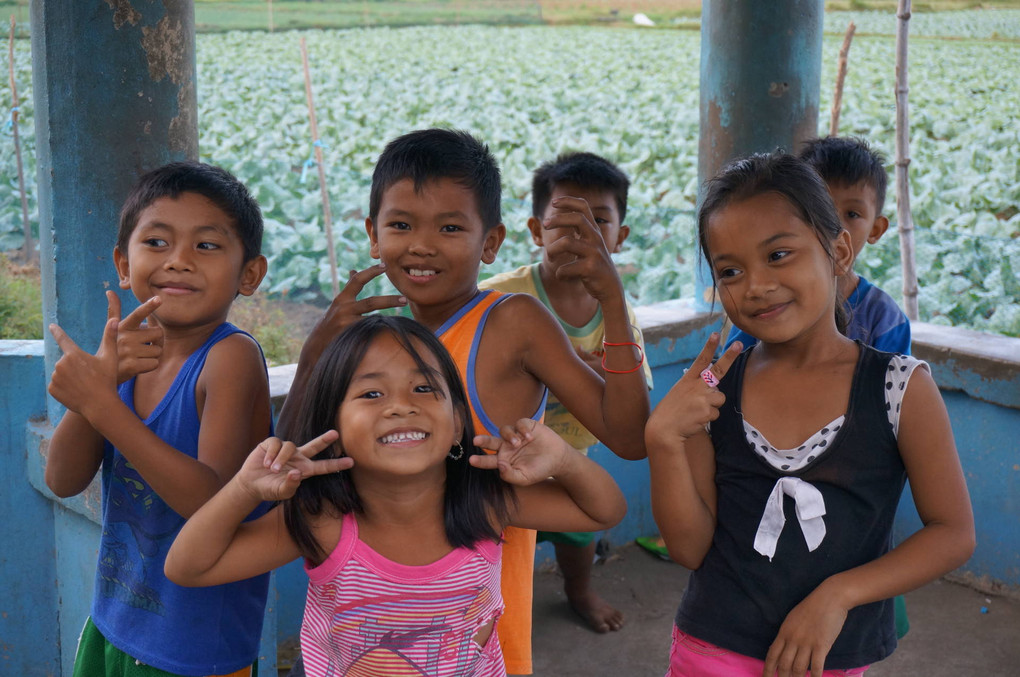The SDGs we aim to achieve
![]()
![]()
![]()
Please support Fruits SDGs Station’s efforts to bring fruit wallets to the people of the Philippines.
The Philippines is a Southeast Asian country located in the Western Pacific Ocean, consisting of more than 7,000 islands with a population of 110 million. The Philippines has experienced economic growth in recent years, but behind this growth, serious economic disparities are emerging.
According to the Philippine Statistics Authority, the poverty rate in the Philippines was 23.7% in 2021.
This means that 26.14 million people out of a population of about 111 million are living in hardship. About 77% of the poor in the Philippines live in rural areas, where their lives are very different from the affluent lives in urban areas.

The main cause of this rural poverty is the large landownership system formed under the colonial rule of Spain and the U.S., and the plantations (a system of large-scale monoculture of commodity crops for export, including bananas, pineapples, and satsumas) under that system. Bananas, pineapples, sugarcane, coconuts, etc. are produced).

In the large landholding system, the majority of people actually engaged in agriculture (peasants and agricultural laborers) do not own their own land. If they own their own land, all the harvest is theirs, but the peasants must pay a high rate of peasant fees to the landowner, and the agricultural laborers are forced to work under poor working conditions with low wages and long hours.
To solve these problems, the Comprehensive Agrarian Reform Plan of the Philippines used to allow people belonging to classified groups to benefit from land allocation. Today, however, the development of agricultural land infrastructure has not progressed due to delays in economic assistance.
Thus, in rural areas, people are engaged in low-productivity work and cannot earn much wage, resulting in economic hardship.

There are also causes and cycles of poverty that are unique to Philippine society.
(1) Class disparity
(2) Educational background
(3) Cheap labor hired from developed countries
(1) Class disparity
The Philippines is experiencing economic growth, but only 40% of the country’s middle class and above are benefiting from this growth. In today’s Philippine society, the flow of money is not reaching those who really need it, but to those who are living without any inconvenience.
This flow of money to the middle class and above is increasing year by year.
This trend in Philippine society has prevented people in rural areas facing poverty from becoming affluent.
(2) Educational background
Educational background is very important in choosing a profession in the Philippines.
Examples of the importance of educational background in choosing a profession in the Philippines are)
To work as a babysitter in Manila, you must have an elementary school diploma.
To work on a factory production line, a high school diploma is required.
To become a convenience store clerk, a high school diploma plus English proficiency is required.
To work as a babysitter, you must have graduated from elementary school, and to work as a convenience store clerk, you must have graduated from high school and have English proficiency.
However, currently, more than 300,000 children are currently without access to basic education each year, and the majority of these children are from rural areas.
Those without education are therefore forced to choose from low-income jobs such as day laborers, domestic help, and peddlers, and their wages are barely 10,000 yen after working for a month.
Thus, education and poverty are linked, and children in rural areas who cannot afford to invest money in education are stuck in a cycle of poverty.
(iii) Cheaply hired workers from developed countries
Traders from developed countries hire local people to produce agricultural and fishery products for export.
This is common not only in the Philippines but also in developing countries.
However, in many cases, despite working long hours, they receive only less than a day’s worth of living expenses.
Because of the existence of such unscrupulous companies, people in local rural areas are unable to escape from poverty at all.
Thus, the poor in the Philippines, especially in rural areas, are unable to escape the cycle of poverty and are stuck in low-wage labor.
There is also the problem of street children whose parents go to work and leave their children behind in order to escape the cycle of poverty.

The United States Agency for International Development (USAID) defines street children in the following four categories
(1) Children who have no home and no support from their families.
(2) Children who return home regularly but spend most of their time on the streets
(iii) Children whose families themselves are homeless and live on the streets with their families
(4) Children who are protected but may return to living on the street.
Especially in the case of street children in (1), who migrate from rural areas and leave their children behind, there are many worst-case scenarios in which the children get involved in crimes or get involved in drugs.
To solve these problems!
Fruits will solve the problems of rural poverty and street children in the Philippines through charity.
(1) Rural Poverty Problem
Fruits will solve the rural poverty problem in the Philippines by creating a fund for agricultural education, providing technology, and purchasing fertilizers. This will help to solve the poverty problem of farmers by improving productivity and chemical farming for farmers suffering from low productivity.
Agricultural education (dispatch of lecturers to one rural area): $10,000
Purchase of fertilizers: $30,000
Through this activity, rural people can increase their income and lead more affluent lives by providing agricultural education, technology, and purchasing fertilizers.
(2) Regarding the issue of street children
Fruits will provide educational support to solve the problem of street children in the Philippines by helping them to improve their abilities and to acquire educational backgrounds.
Educational support (per area): $1,000
This will enable street children to engage in more productive work through educational support.
All donations to the Philippines through Fruits Station will be made in conjunction with Filipino superstar and former professional boxer Manny Pacquiao.

Mr. Pacquiao wasborn and raised in a poor rural village in the Philippines, and he wants to help as many children in poor areas of the Philippines as possible.
Through the collaboration between Fruits and Mr. Pacquiao’s charity activities, we will cooperate in solving the problems of poverty in rural areas and fishing villages in the Philippines, poverty among children, and education problems caused by poverty, and support as many people suffering from poverty and hunger as possible.
Through Fruits’ charity activities
Will you join us to help alleviate poverty, which affects one out of every four Filipinos, and solve the problems of poverty and hunger for as many children as possible?
FRUITS will work with Mr. Pacquiao to expand our efforts to directly support children in the Philippines.
FRUITS will expand its efforts to directly support Filipino children with Mr. Pacquiao in the future.











There are no reviews yet.